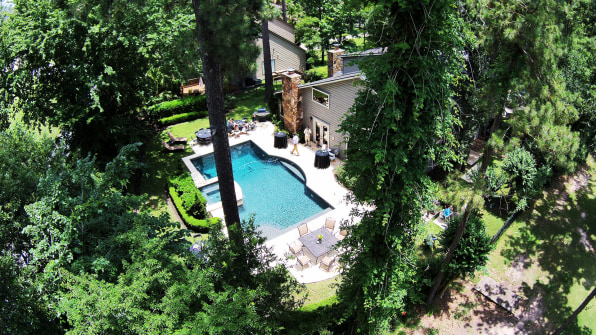How To Get On The No Fly List
The White House would seem like an obvious place not to fly a drone for giggles. But last month, hobbyists managed to crash accidentally drone at the most secure address in the nation.
Whether you're an average homeowner or the leader of the free world, a small company has a simple idea–a drone "no fly zone" database–that could prevent unwanted privacy (and security) intrusions. Anyone can register their address (here), and drone hardware and software makers can use the database to create an "invisible shield" around each property to stop their drones from flying there.
The concept is similar to the national "do not call" registry for telemarketers. However, unlike that registry, participation by companies is completely voluntary. No U.S. legislation or regulation has yet truly dealt with the privacy problems posed by a sky full of flying cameras, and how to do so presents a confused mess. Privacy concerns fall outside mandate of the FAA, and its long-awaited regulations for commercial drone operators proposed this week don't address the potential for civil liberty intrusions. The White House did release a memo asking government agencies to examine their own drone data collection policies, but no rules apply to private operators yet.

NoFlyZone, the company behind the database, wants the industry to regulate itself in order to increase the acceptance of drones in the skies and minimize the negative consequences. Its CEO, Ben Marcus, is an experienced pilot who previously co-founded an aircraft brokerage firm.
But setting up the no-fly database poses many questions that illustrate the need for a harder set of rules. For example, it includes the coordinates of each property and its boundaries, so drone companies can code so-called "geo-fences" into their software or firmware that prevent drone operators from flying over the address (many are already doing this for airports). But it would be up to the companies to decide how large and high of a privacy zone to give each registered address or even whether to block drones at all. "Many manufacturers and operators may use the no-fly database as advisory only in nature," the NoFlyZone site says. And what about people who want to fly their own drones over their property (or allow someone else to) but not others? Without Internet-connected drones that allow for more detailed privacy preferences, that sort of nuance isn't easy yet.
On its site, NoFlyZone says it will keep its service free for residential properties, but may eventually charge businesses that want to register their properties and eventually offer premium, customizable privacy preferences. The database also will also provide other obvious addresses that responsible drone operators should avoid, such as military installations and airports. So far NoFlyZone is working with about half a dozen drone companies, according to its website.
At least one company will be interested. DJI Phantom, the manufacturer of the drone that crashed on the White House lawn, is already planning to use geo-fencing to stop its drones from getting anywhere near the entire city of Washington, D.C.–let alone the White House.
How To Get On The No Fly List
Source: https://www.fastcompany.com/3042526/quick-put-your-house-on-the-mostly-meaningless-drone-no-fly-list
Posted by: campbellsciet1985.blogspot.com

0 Response to "How To Get On The No Fly List"
Post a Comment